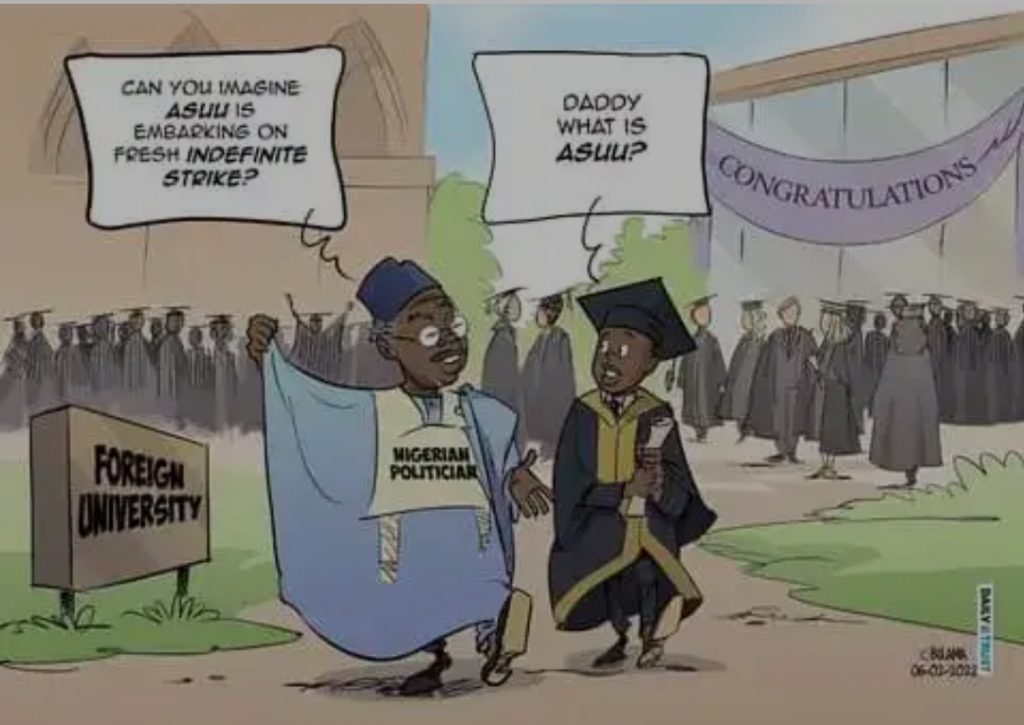Chronicles of the Second Longest Academic Strike in Nigeria – Yet. Volume 4.

The university campus and its environs make up a whole diverse society. Every community depends on its socio-economic architecture. And the university campus is not different. Businesses flourish when there is a market for goods and services. Inextricably, economic activities in the university hinge on the presence of students on campus. However, the eighth months long strike saw to the disruption of these activities. One can’t but imagine the great toll it had on campus vendors and businesses. These vendors, the goods they sell, and the services they provide can never be trivialised.
What was it like for them, without a means of livelihood? How did the recurring strike affect their businesses and welfare?
This is why we decided to interview a few of them and make their ordeals during the strike period known to our esteemed readers.

TRICYCLE (keke) DRIVER
We understand that students left school and there was nobody for you to transport. Or you had people to carry, but people were not moving as usual. We would like a few words from you on the strike period.
This is not the only work we do, so I fell back on my side job. During the strike, I had to take up other things to survive. This proved the fact that one had to have other means of livelihood.
Can we then say the strike didn’t really affect you?
No, the strike affected me because my other job depended on the school economy. I run a barbershop on the side. The number of customers also reduced because students weren’t in school. During this period, sales were very poor.
Which gives you more money?
They both give me good money. You can’t compare business in school with outside school. Like the Keke inside school has regulated prices, we can’t charge more than N50. So it’s not been really easy.
Were you operating in school during the strike, or you stayed at your barber shop throughout?
I was shuffling between both so I’ll do a little here and go back to the barbershop. But I didn’t stop coming.
Are you still shuffling between both businesses now that school has resumed?
No, I have now employed a worker in the barbershop, and I face the logistics business in school.
No one can wish for the strike again; how has the strike affected you?
It affected someone really close to me, my sister. So she ought to have graduated two years ago, but the strike kept her in this school, which is really sad.
VENDOR 1
Hello Ma, we are members of the UIMSA preliminary press, and we would like a few words from you about the strike period. Hope you don’t mind.
No, I do not mind.
Were people still coming to work during the strike?
Some people still came to work, but the campus was quiet.
For you to have noticed this, that means you kept coming?
No, I only came once in a while because a building was under construction, and it was good for business. But there was nothing. There were no lecturers throughout the day; you could only meet two lecturers throughout the day. Sometimes, I would come to my shop in school and only sell something worth N200, minus the profits.
How were you coping with the transport fare?
My transport fare is N800 per day because I am staying at Apete. It was a really tough time. It started to look like I was wasting my money, so I stopped coming.
How were you coping with expenses then?
I had helpers who did not forget me and kept sending help in the ways they could, especially for the kids.
You just mentioned that you have kids. How did you cope with their needs during that period?
When my kids were about to resume school, I cried. There was no means to get them to school. Everywhere was dry. But I thank God.
Now that the strike has ended, have things gone back to normal?
It hasn’t, but it’s better than it was during the strike. My whole shop was empty; I had to look for money to stock up. It was like starting my business all over again. Whenever I came during the strike, some NASU officials bought goods from me on credit.
Did you suffer any loss by having expired goods?
No, thankfully, for me, I didn’t suffer any loss due to that.
How about the rent for this shop?
We paid rent the very week the strike was announced. This means that our rent has been reading. We do not know if they’ll be considerate toward us and generous by overlooking those months. But right now, all things point towards the fact that the rent has gone.
VENDOR 2
How were you coping during the strike?
God has been taking care of me. I will sometimes come to the shop and just make N150. But the lord was meeting my needs in more ways than one.
Were you coming during the strike?
No, I wasn’t coming to school campus. I stayed at home throughout.
Now that we’ve resumed, have things gone back to normal?
No, not yet. But we have progressed. It’s better than nothing.
Did you have to cater to the needs of your children at the university?
I have just one child left in the university, and God has been gracious. Her siblings send me money whenever I need it.
How has the family been coping?
People stood up to help me. I didn’t even have to ask. I don’t know how I would have survived if not for these people. My husband is also a member of NASU, so the strike affected him. It got to a point where he had to start using his motorcycle for public transport to bring something home for us.
It doesn’t stop here. Next, we will meet the major actors, academic staff, and make an exposition of their experiences, in the next volume. Hang on!
Peter Adeyemo and Afeezah Wojuade




Great content kudo to the uimsa press more strength and May the Almighty help everyone affected during this strike
This is such an amazing read! Kudos to you guys 👏🏾. Anticipating the next episode.
Well done, guys!!
Looking forward to more volumes.